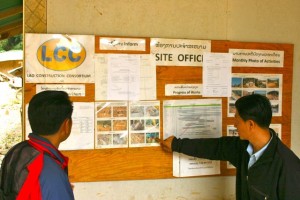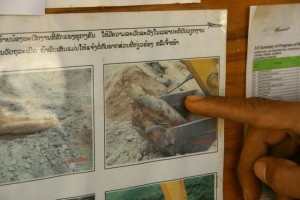Project Phongsali 2011: Road construction unearths bombs and feeds a black market in explosives and scrap.

Photos outside the Lao Construction Consortium office show photos of bombs unearthed by company excavators. (See closeup below)
Day Thirty-Nine
The decision by the Lao Construction Consortium (LCC) to rebuild Highway 2E without first clearing ordnance along the roadway clearly puts their employees at risk. We’ve repeatedly spoken with equipment operators who know that their lives could end at any time, should they happen upon a bomb. Their response is usually that they have to accept the risk or loose their jobs.

LCC has not let bombs slow construction. When equipment operators find a bomb they simply dig it out of the earth and set it aside. Then, they sell the bomb to villagers who cart it away with the intention of harvesting the explosive inside.
In reply, he told me that, in addition to the big bombs, he’d also struck two cluster bomblets, one of which exploded. Luckily, he was not injured. He summed up his situation by saying, “I’m only a small man. What can I do? This is my job and I have to do what the big men tell me to do.”
The company’s mishandling of UXO has impacted nearly every village along the route, since they’ve enabled a black market in scrap and explosives to function throughout the region. Operators who find big bombs sell them to villagers, who then haul them home to open. Operators tell us they can get 400,000 to 500,000 kip for the larger general-purpose bombs. ($50 to $65 US) Currently, the black market price for high explosive is over $2.00 per pound.
The most common general-purpose bomb we are finding weighs 750 pounds and contains nearly 375 pounds of explosive. A villager willing to risk his life cracking open a bomb that size stands to make hundreds of dollars profit. In this nation of subsistence farmers, that’s a staggering sum.
We Americans look at a bomb and see a bomb. We wonder aloud why anyone would risk life and limb by tampering with it. Here in Phongsali, people look at a bomb and see a motorbike, a sewing machine, school tuition, a new roof, a refrigerator—items that dramatically alter a family’s quality of life and, perhaps, their economic future.
